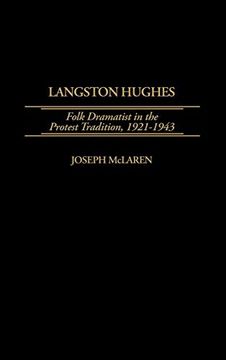Compartir
Langston Hughes: Folk Dramatist in the Protest Tradition, 1921-1943 (en Inglés)
Joseph Mclaren (Autor)
·
Praeger
· Tapa Dura
Langston Hughes: Folk Dramatist in the Protest Tradition, 1921-1943 (en Inglés) - Joseph Mclaren
$ 120.310
$ 240.620
Ahorras: $ 120.310
Elige la lista en la que quieres agregar tu producto o crea una nueva lista
✓ Producto agregado correctamente a la lista de deseos.
Ir a Mis Listas
Origen: Estados Unidos
(Costos de importación incluídos en el precio)
Se enviará desde nuestra bodega entre el
Viernes 07 de Junio y el
Miércoles 19 de Junio.
Lo recibirás en cualquier lugar de Chile entre 1 y 3 días hábiles luego del envío.
Reseña del libro "Langston Hughes: Folk Dramatist in the Protest Tradition, 1921-1943 (en Inglés)"
Though known primarily as a poet, Langston Hughes crafted well over 40 theatrical works. This book examines Hughes's stage pieces from his first published play, The Gold Piece (1921), through his post-radical wartime effort, For This We Fight (1943). Hughes's stage writing of this period includes such forms as the folk comedy, the protest drama, the historical play and the blues opera. McLaren concludes that the democratic argument is ultimately employed by Hughes to challenge segregation in the military and that Hughes's iconography prefigures the black aesthetic of the 1960s. Photographs complement the text.McLaren demonstrates that Hughes's folk comedies, such as Mule Bone (1930) and Little Ham (1936), valorize folk humor and black vernacular. Written in collaboration with Zora Neale Hurston, Mule Bone resulted in a literary controversy. The study also analyzes Hughes's radical plays, including Scottsboro Limited (1931) and Don't You Want to Be Free? (1938), which blend poetry and drama. Also addressed is Hughes's association with community drama groups, especially Karamu Theatre in Cleveland and the Harlem Suitcase Theatre, which premiered Don't You Want to Be Free? and a number of Hughes's satires. In the early 1940s, Hughes entered his post-radical period but continued to protest fascism and celebrate black heroes and heroines. This transition is reflected in his critique of Richard Wright's Native Son. McLaren concludes that the democratic argument is used to challenge segregation in the military and that Hughes's iconography prefigures the black aesthetic of the 1960s. This book will be of great interest to students and scholars of radical theatre and African American drama. Photographs complement the text.
- 0% (0)
- 0% (0)
- 0% (0)
- 0% (0)
- 0% (0)
Todos los libros de nuestro catálogo son Originales.
El libro está escrito en Inglés.
La encuadernación de esta edición es Tapa Dura.
✓ Producto agregado correctamente al carro, Ir a Pagar.

